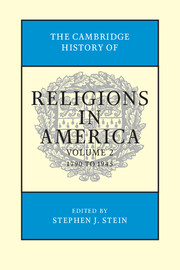Book contents
- Frontmatter
- Contents
- Contributors
- Editor's Introduction
- SECTION I RELIGION IN NORTH AMERICA
- SECTION II RELIGIONS IN THE NEW NATION, 1790–1865
- SECTION III CHANGING RELIGIOUS REALITIES
- SECTION IV RELIGIOUS RESPONSES TO MODERN LIFE AND THOUGHT
- 21 Religion and Immigration, 1865–1945
- 22 Religion and the Modern City, 1865–1945
- 23 Religious Responses to Industrialization, 1865–1945
- 24 Religious Responses to Modern Science, 1865–1945
- 25 Religious Responses to Philosophy in America, 1865–1945
- 26 Fundamentalism
- 27 Religiously Informed Social Reform and Reaction in the Era of the Great Depression
- 28 Nativism from the New Republic to the Cold War
- 29 Between God and Caesar: World War I and America's Religious Communities
- 30 World War II and America's Religious Communities
- SECTION V COMPARATIVE ESSAYS
- SECTION VI RELIGION AND DIVERSE AREAS
- Index
- References
23 - Religious Responses to Industrialization, 1865–1945
from SECTION IV - RELIGIOUS RESPONSES TO MODERN LIFE AND THOUGHT
Published online by Cambridge University Press: 28 July 2012
- Frontmatter
- Contents
- Contributors
- Editor's Introduction
- SECTION I RELIGION IN NORTH AMERICA
- SECTION II RELIGIONS IN THE NEW NATION, 1790–1865
- SECTION III CHANGING RELIGIOUS REALITIES
- SECTION IV RELIGIOUS RESPONSES TO MODERN LIFE AND THOUGHT
- 21 Religion and Immigration, 1865–1945
- 22 Religion and the Modern City, 1865–1945
- 23 Religious Responses to Industrialization, 1865–1945
- 24 Religious Responses to Modern Science, 1865–1945
- 25 Religious Responses to Philosophy in America, 1865–1945
- 26 Fundamentalism
- 27 Religiously Informed Social Reform and Reaction in the Era of the Great Depression
- 28 Nativism from the New Republic to the Cold War
- 29 Between God and Caesar: World War I and America's Religious Communities
- 30 World War II and America's Religious Communities
- SECTION V COMPARATIVE ESSAYS
- SECTION VI RELIGION AND DIVERSE AREAS
- Index
- References
Summary
During the eight decades spanning the end of the U.S. Civil War and the conclusion of World War II, the United States underwent a profound transformation. The nation, broken in 1865, emerged in 1945 as the most powerful country in the world. One of the driving forces of change was industrial development, which began in earnest in the last three decades of the nineteenth century. Capital investments in new technologies and expanding national and international markets throughout the century enabled the processing of agricultural commodities and mineral resources as well as the manufacturing of consumer goods. From a land dominated by rural and small-town life, the United States became an urban and industrial giant by the first decades of the twentieth century.
The radical shifts that occurred in these eight decades took a heavy toll on social relations, cultural values, and Americans' everyday lives. The nature and condition of labor required in an industrial capitalist economy differed significantly from that of the artisanal shop, agricultural work, and small-scale factories that defined antebellum America. Individual craftsmanship and artisanal skills gradually gave ground to machine production and assembly lines. Labor in an industrial economy became a cost of production that employers and investors wanted to keep as low as possible. Workers' strikes against their employers in the 1870s and 1880s typically revolved around the sudden reduction of wages or changes in the condition of work.
- Type
- Chapter
- Information
- The Cambridge History of Religions in America , pp. 499 - 522Publisher: Cambridge University PressPrint publication year: 2000



